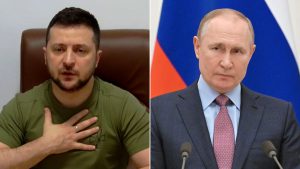Vladimir and Volodimir, speaking a different language: Russian

by Lev Tsitrin
One of the more striking episodes in the rich biography of Niels Bohr, the great nuclear physicist, was his meeting with Winston Churchill prior to the end of WW2. Bohr, a humanist, was horrified by the thought of military use of the nuclear energy, and tried to convince Roosevelt and Churchill to share the technology with the world to make sure it is only used for peaceful purposes. Roosevelt was not unsympathetic — or at least, he bit his tongue; but Churchill saw the voluntary surrender of the nuclear monopoly as out-and-out madness, warning that Bohr was a threat, potentially leaking nuclear secrets to the Soviets. The outcome of their meeting deeply depressed Bohr; he ruefully told his son that he and Churchill were speaking different languages. That was a metaphor, of course — the language in which they communicated was English — but the ideas they conveyed to each other by the use of that language were so incompatible that both felt as if they indeed spoke to each other in an alien tongue.
“Speaking different languages” is what one also sees in Youtube videos of Vladimir Putin’s justification of what he likes to term a “limited military operation” in Ukraine, and in Volodimir Zelensky’s recent long interview given to a group of Russian journalists (which was promptly blocked in Russia). Both namesakes spoke Russian, but their focus and concerns were so completely different that the contrast can only be described as “speaking different languages.”
Vladimir Putin’s focus is perhaps best described as a grieving soliloquy in front of Tsar’s double-headed eagle bedecked in the coats-of-arms of Russian Empire’s many possessions, and verbalized in the Tzar’s coronation declaration, “By the grace of God we, Nicholas II, the Emperor and Autocrat of All Russia, the Tzar of Poland, the Grand Duke of Finland, etc, etc, etc.” — a grievous reminder that so many of those imperial possession are now gone, including the “Little Russia” known nowadays as Ukraine. Vladimir Putin’s grievances are heraldic in nature, and belong to the long-gone age of chivalry and imperial rule. He talks, in an imperial monologue, of the glory of the past.
For Volodimir Zelensky, the mummified past is of no concern, As plainly seen in his interview, his concern is for the people, both the Ukrainians and the Russians — the individuals who are under fire, risking their lives, and getting maimed and killed with each passing minute of the war. He mocks the very notion of chivalrous heroism when talking, for instance, about the specter of recovering the Crimea by force, that so obsesses and scares his Russian counterpart and namesake. His concern is not for glory, but for saving lives. His first priority is the ceasefire, as a starting point for resuming peaceful life. And his manner of delivery is totally different: Zelensky is animated, engaged and emotional, he is not the legal, historical, or linguistic automata. Zelensky welcomes interruptions, dialog, discussion, he listens to his interlocutors, he hears their points. He does not preach. He explains, while Vladimir Putin pronounces grand solemn truths from the on-high of a grand palatial Kremlin room of state.
The manner of delivery fully corresponds to the substance of their views — one is a life-affirming humanist, the other is a cold proponent of rigid ideological principals, their human costs of implementation being of no importance.
If those two Russian youtube videos be considered a dialog, then there is hardly a better example of two people using the Russian language to speak in two utterly different tongues. The languages of grand ambitions, and that of human warmth and life, are indeed very different. Even if individual words are the same, the motivations of the speakers, and their sentiment and grievances are simply incompatible. When people talk past each other, as did Bohr and Churchill, as do Zelensky and Putin, it is indeed as if they talk different languages — be it English or Russian. Which is such a shame…